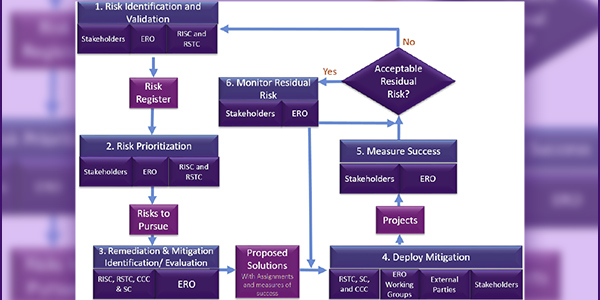NERC’s Reliability and Security Technical Committee (RSTC) held its final meeting of the year via conference call on Wednesday.
Only the committee’s inaugural meeting in March was held in person, since then all of its meetings have been held remotely. (See RSTC Tackles Organization Issues in First Meeting.) This arrangement is set to continue into next year, as Chair Greg Ford of Georgia System Operations confirmed the committee’s first three quarterly meetings will be held online. The committee has not reached a decision on the last meeting of 2021, currently scheduled for Dec. 14-15.
Approvals
The committee accepted several documents to be posted for a 45-day comment period:
- Revisions by the Real Time Operating Subcommittee (RTOS) and Electric Gas Working Group to NERC’s reliability guideline for gas and electrical operational coordination considerations
- Reliability guideline on battery energy storage systems and hybrid power plant modeling and performance developed by the Inverter-based Resources Performance Working Group
- Security guideline for the electricity sector on assessing and reducing risk developed by the Security Working Group
- Three-year reviews by the Resources Subcommittee of two reliability guidelines — relating to area control error diversity interchange and operating reserve management — as well as the reference document on balancing and frequency control
The committee also approved revisions to the reliability guideline for generating unit winter weather readiness. The Event Analysis Subcommittee updated the guideline, which was posted for industry comment in August. (See Reliability Guidelines, Standards Posted for Comment.) In addition, the Supply Chain Working Group (SCWG) gained approval for a guideline on supply chain procurement language that was posted for comment at the same time.
Progress on RSTC Transition
The committee moved toward finalizing its takeover of the business previously handled by the Planning, Operating, and Critical Infrastructure Planning committees, which disbanded in March. (See NERC OC, PC, and CIPC Briefs: March 3-4, 2020.) Scope documents for the SCWG, the EMP Working Group (EMPWG) (formerly they EMP Task Force), the RTOS, the Reliability Assessments Subcommittee and the Probabilistic Assessments Working Group were approved by the full committee as called for in the transition plan, along with the 2021 work plan for the EMPWG.
Also approved at Wednesday’s meeting was the revised scope document for the Security Integration and Technology Enablement Subcommittee (SITES). The SITES scope document was originally presented at the committee’s September meeting but was tabled for further revisions. (See “Decisions Delayed by Transition Plan Debate,” NERC RSTC Briefs: Sept. 15, 2020.) Several members had expressed surprise at its focus on cybersecurity at the expense of transformative business applications, which they had understood to be the subcommittee’s purpose.
RSTC Vice Chair David Zwergel of MISO, who led a volunteer team to revise the document, presented the changes for approval, which was received. The revisions emphasize the subcommittee’s goal of “proactively [supporting] industry in integration of new technologies.”
Carl Turner, engineering services director at Florida Municipal Power Agency and one of the members who objected to the original document, thanked leadership for their patience and willingness to allow members to contribute to the document.
“I’m sure some folks feel like it may have delayed a meeting, doing that, but I think it was valuable. And I’d like us to think about, when we have … major things in the future, having some sort of a process like that planned to get more people on board from an early stage,” Turner said.
Zwergel also presented SITES’ draft work plan, which will be presented for approval at the next RSTC meeting in March.
Committee Endorses Risk Framework

NERC Chief Engineer Mark Lauby presented the final version of NERC’s planned Framework to Address Known and Emerging Reliability and Security Risks, which the Reliability Issues Steering Committee (RISC) began developing earlier this year, to the committee, which endorsed the document. NERC’s Board of Trustees is expected to endorse the framework at its upcoming meeting in February.
The latest revisions aim to clarify the role of the RISC, RSTC, Standards Committee and Compliance and Certification Committee in NERC’s risk mitigation process. Previous iterations primarily focused on the RISC and RSTC. Also added to the new document is language acknowledging the role of regional entities, trade groups and other industry participants in recognizing and responding to emerging risks. The revisions were mainly undertaken in response to industry comments received after the framework was included in the Policy Input Letter for NERC’s Board of Trustees in October.







